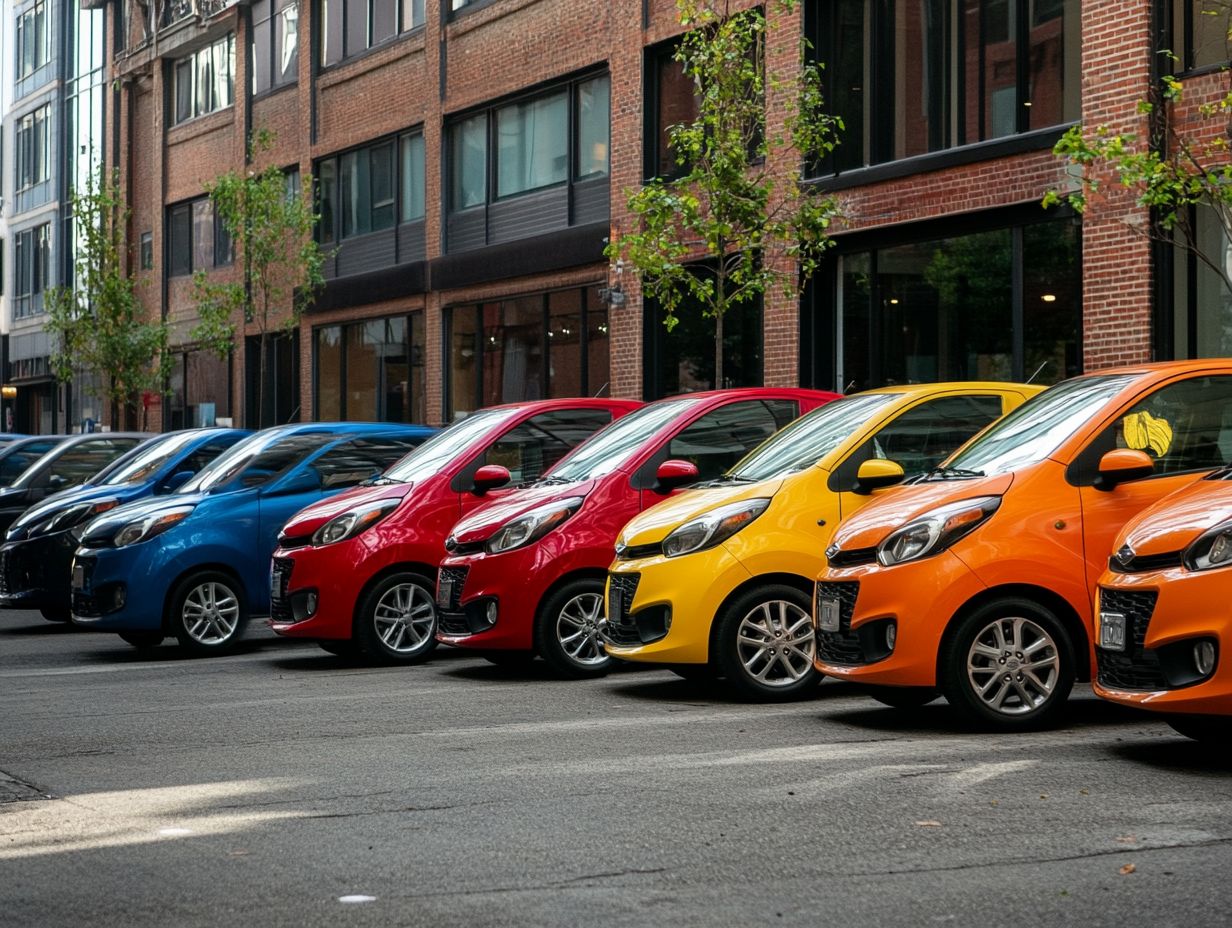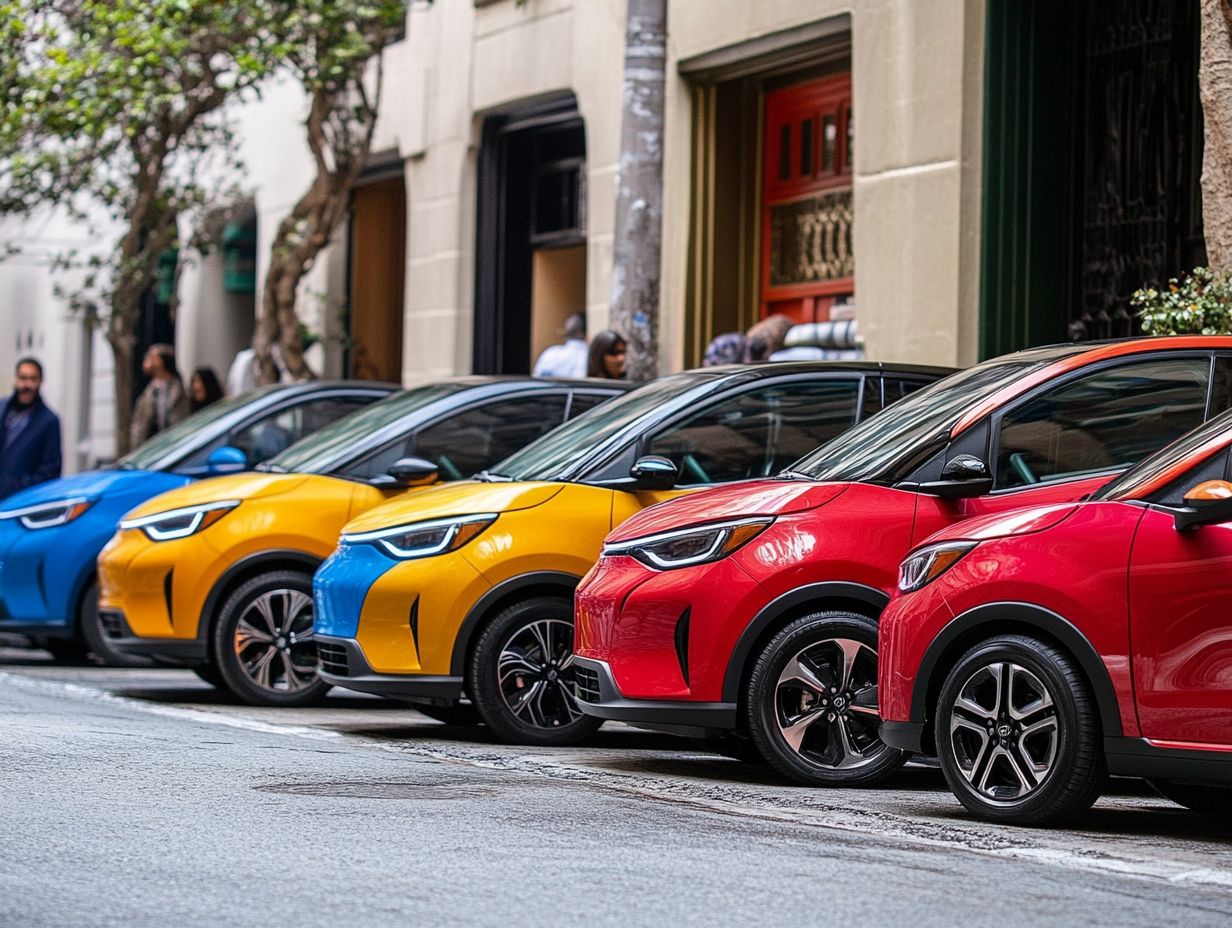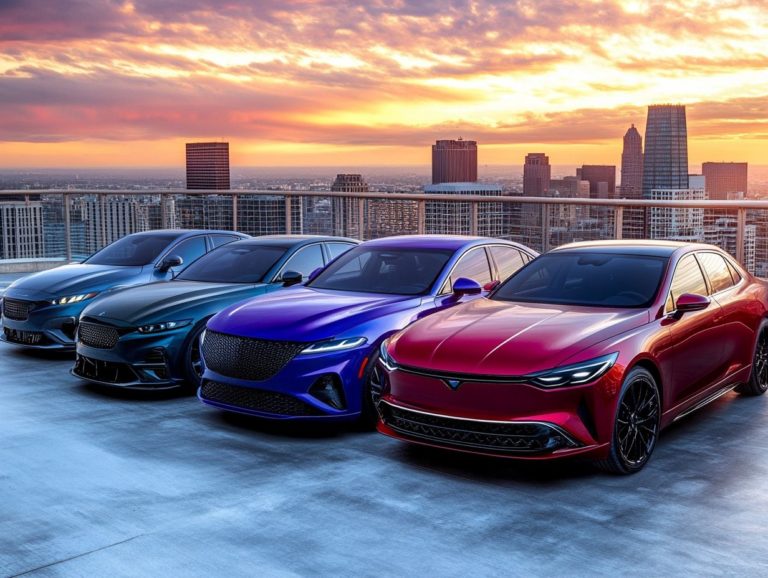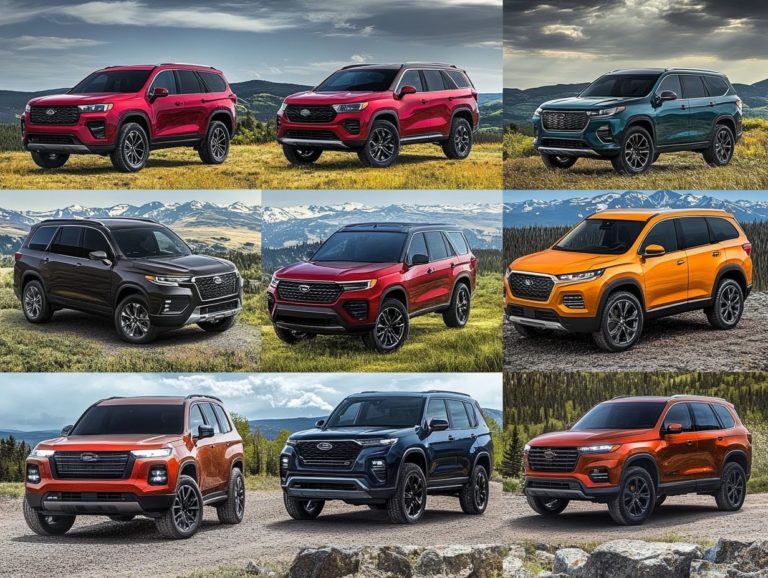User Experiences: The Best Budget Cars
Finding the right budget car can feel like a big challenge, but it s easier than you think! With countless options available, choosing the ideal vehicle involves more than just looking at the price tag.
This guide explores essential factors to consider, highlights the top budget-friendly cars under $15,000, and examines their features, safety ratings, and fuel efficiency.
You’ll also find invaluable tips for negotiation and financing. Whether you’re a first-time buyer or simply looking to save, consider this your roadmap to making an informed decision.
Contents
- Key Takeaways:
- 2. Factors to Consider When Choosing a Budget Car
- 3. Top Budget Cars Under $15,000
- 4. Best Features and Benefits of Each Car
- 5. Comparison of Fuel Efficiency
- 6. Safety Ratings and Features
- 7. Comfort and Convenience Features
- 8. Performance and Handling
- 9. Reliability and Maintenance Costs
- 10. Customer Reviews and Satisfaction Ratings
- 11. Tips for Negotiating the Best Price
- 12. Financing Options for Budget Cars
- 13. Additional Costs to Consider
- What Are the Most Common Budget Cars on the Market?
- Frequently Asked Questions
Key Takeaways:

- Consider fuel efficiency, safety ratings, and customer reviews when choosing a budget car.
- Top budget cars under $15,000 offer great features like performance and safety.
- Negotiate the best price and factor in costs like maintenance and financing options.
2. Factors to Consider When Choosing a Budget Car
When selecting a budget car, several important factors come into play. Overall costs, interest rates on car loans, and having a good credit score can greatly affect your financing options.
It’s crucial to closely examine both maintenance expenses and fuel efficiency. These elements significantly impact your total ownership costs over time. A budget-friendly vehicle might save you money upfront, but high ongoing costs can quickly eat away at those savings.
Understanding how a solid credit score helps you get better loan terms is essential for managing your budget effectively. Also, consider trade-in values and available incentive offers to help reduce your initial expenses and make smarter financial decisions.
3. Top Budget Cars Under $15,000
Discovering the best budget cars under $15,000 is exciting, and several models shine in reliability and consumer satisfaction, as noted by Consumer Reports.
Take the Honda Civic, for example it s often praised for its durability and impressive fuel efficiency, making it a top choice for value seekers. The Toyota Corolla also stands out, boasting high safety ratings and a reputation for longevity, perfect for anyone who values peace of mind while driving.
If you’re looking for something a bit more lively, the Ford Fiesta offers an exciting driving experience and remains affordable to maintain, making it especially attractive for budget-conscious shoppers.
These vehicles are equipped with essential features like Bluetooth connectivity and advanced safety systems, keeping overall ownership costs low. They re perfect selections for discerning consumers who want dependable cars without straining their wallets.
4. Best Features and Benefits of Each Car
The best budget cars come with an impressive array of features that enhance your experience and deliver outstanding road-test performance. For those interested in fuel efficiency, checking out user feedback on the best fuel-efficient cars can help make them a smart choice for budget-conscious buyers.
Focusing on fuel efficiency and low maintenance costs, these vehicles often include modern safety technologies, spacious interiors, and user-friendly infotainment systems. Such qualities elevate your driving experience, assuring you that you re making a smart investment.
With a blend of reliability and comfort, these cars handle daily use well, retaining their value over time while providing you with the peace of mind you deserve.
5. Comparison of Fuel Efficiency
Fuel efficiency is an important factor for you as a car buyer, especially when weighing the long-term costs tied to owning budget-friendly vehicles. It directly influences your monthly expenses and the overall transaction prices.
By comparing various budget models, you can uncover notable differences in miles per gallon that translate into real savings at the pump. For example, certain compact sedans may proudly showcase impressive fuel economy figures, often surpassing those of their larger counterparts. This reduces how often you need to refuel.
Over time, these efficiencies add up. They make the overall cost of ownership significantly lower for those who prioritize fuel-efficient options. Understanding these nuances not only aids you in making informed decisions but also enhances your financial planning for everyday expenses, ultimately lightening the load of ownership.
6. Safety Ratings and Features
Safety ratings and features are crucial when selecting a budget car. Ensuring compliance with safety standards protects not only your well-being but also enhances the car’s overall reliability.
These ratings stem from rigorous testing and evaluation performed by independent organizations, with Consumer Reports being a key player in assessing various models. Their in-depth reviews encompass crash test results while also evaluating critical factors like braking effectiveness, structural integrity, and technology integration.
When you’re shopping on a budget, it s vital to seek out essential safety features such as:
- Anti-lock braking systems
- Electronic stability control
- Multiple airbags
- Advanced safety features like lane departure warnings
By prioritizing these elements, you can make informed decisions that provide peace of mind while optimizing value.
7. Comfort and Convenience Features

Comfort and convenience features can transform your driving experience into something truly enjoyable! They greatly enhance your satisfaction in budget cars, making daily commutes and long drives less taxing.
These features often include adjustable seating, intuitive infotainment systems, and ample storage solutions tailored to diverse lifestyles. For example, air conditioning ensures a pleasant climate no matter the weather, while user-friendly touchscreen displays make it easy for you to access navigation and entertainment during your journeys.
Cruise control is another invaluable feature that can minimize fatigue on long trips, allowing you to maintain a steady speed without the hassle of constant acceleration adjustments.
In sum, these elements not only contribute to a more enjoyable driving experience but also cultivate a sense of pride and contentment for you as an owner proving that value and comfort can indeed coexist.
8. Performance and Handling
The performance and handling of budget cars are key factors that enhance their appeal, enabling you to enjoy a gratifying driving experience without straining your finances.
Metrics like acceleration, braking, and handling play a significant role in your decision-making process when seeking value. For example, you might find a compact model that accelerates from 0 to 60 mph in just under 8 seconds, providing a lively response when merging onto the highway.
Effective braking distances are equally important; certain budget cars can come to a halt from 60 mph in about 120 feet, demonstrating their ability to prioritize safety while delivering commendable performance. The handling characteristics show how well these vehicles tackle tight corners, maintaining stability and driver confidence proving that you don t have to spend a fortune to enjoy a well-rounded driving experience.
9. Reliability and Maintenance Costs
Reliability and maintenance costs matter significantly when you re searching for budget-friendly cars. These factors shape your long-term ownership expenses.
A reliable vehicle performs well without frequent breakdowns. This not only reduces stress but also helps you save money.
Reliable cars need fewer repairs and have lower maintenance costs. Look for vehicles with high reliability ratings from trusted reviews.
Research the car s history, especially common issues and parts availability. Choosing models known for durability, like certain sedans or compact cars, can lead to significant savings.
10. Customer Reviews and Satisfaction Ratings
Customer reviews and satisfaction ratings provide valuable insights into the real-world performance of budget cars. For those looking for the best cars for city driving, this information is crucial for making informed decisions.
Data from Consumer Reports reveals that customer feedback shapes perceptions of reliability and overall satisfaction. Positive experiences highlight a model’s strong construction and affordable upkeep, while negative reviews point out recurring issues that could affect your daily use.
By examining these consumer assessments, you can identify which budget cars consistently meet or exceed expectations. For a comprehensive perspective, check out user reviews of the best eco-friendly cars. This approach ensures you select a reliable vehicle tailored to your needs. Ultimately, leveraging these insights is essential for achieving owner satisfaction and minimizing the risk of buyer’s remorse.
11. Tips for Negotiating the Best Price
Negotiating the best price on a budget car requires understanding price offers, knowing your vehicle’s trade-in value, and effectively communicating with local dealers.
Your journey begins with thorough research into the vehicle’s market value and sales trends. This knowledge empowers you to enter negotiations confidently.
Familiarizing yourself with current promotions, incentives, and seasonal discounts can enhance your negotiating position significantly.
Documenting your trade-in’s condition and gathering comparable prices is essential, highlighting its value during discussions. Building rapport with sales personnel creates a more amicable atmosphere, making negotiations smoother.
Your preparation and knowledge will serve as invaluable tools, ensuring the final deal matches your expectations and budget.
12. Financing Options for Budget Cars
Exploring financing options for budget cars is crucial, especially since car loan interest rates can vary based on your credit score and financing method.
Understanding different financing avenues like traditional bank loans versus dealership financing allows you to make informed decisions. Loans offer ownership and flexibility, while leasing may provide lower monthly payments and maintenance perks.
Your credit score plays a vital role in determining eligibility, interest rates, and loan amounts.
If you have a higher credit score, you re likely to enjoy lower rates, making car ownership more accessible. Enhance your credit by paying bills on time and correcting any inaccuracies on your credit reports.
This proactive approach positions you for better financing deals in the future.
13. Additional Costs to Consider

When budgeting for a new car, it’s essential to factor in additional costs like insurance, maintenance, and fuel. These can significantly influence the overall affordability of even the most budget-friendly vehicles.
These expenses can accumulate quickly and are often overlooked during the initial purchasing process. For instance, the cost of insurance can vary widely based on the vehicle s make and model. Sporty or luxury cars typically come with heftier bills.
Maintenance costs vary by model. Some vehicles are known for their reliability and low upkeep, while others need frequent and costly repairs.
Fuel efficiency is another critical aspect to consider for ongoing running costs. Vehicles with higher miles per gallon (mpg) ratings help ensure that you spend less at the pump. To navigate these financial considerations effectively, it’s wise to thoroughly research and compare these factors when selecting a car. Consider not just the purchase price but also the long-term expenses associated with ownership.
What Are the Most Common Budget Cars on the Market?
The most common budget cars on the market come highly recommended by Consumer Reports. They emphasize affordability without compromising on reliability and safety features.
Typically priced between $15,000 and $25,000, these vehicles offer excellent fuel efficiency and boast low maintenance costs. This makes them incredibly attractive for those aiming to save money in the long run.
Models like the Honda Civic and Toyota Corolla are frequently praised for their dependable performance and strong resale values. The Kia Forte and Hyundai Elantra also shine with impressive warranties, providing peace of mind for first-time buyers.
The Nissan Versa stands out for its spacious interior and affordability. It often garners high consumer ratings for its overall value. These fantastic features make them some of the best picks for budget-conscious drivers!
What Are the Pros and Cons of Buying a Budget Car?
Opting for a budget car comes with unique advantages and disadvantages. You might save money upfront, but challenges regarding reliability and overall satisfaction may arise when compared to pricier models.
On the bright side, one of the most alluring features of these affordable vehicles is their significantly lower purchase price. This allows you to stretch your budget further, freeing up funds for other essentials. Plus, insurance costs are typically more manageable, giving you a little extra financial breathing room.
However, consider the potential downsides. Limited features may not cater to every driver s needs or expectations. While a budget-friendly car may seem like a smart initial investment, its resale value could drop faster than that of higher-end counterparts, potentially disrupting your long-term financial plans.
How Can a Budget Car Meet Your Needs and Lifestyle?
A budget car can seamlessly cater to your needs and lifestyle, providing a practical and cost-effective solution without skimping on essential features or reliability.
If you re navigating the urban jungle, a compact model strikes the ideal balance between maneuverability in tight spaces and impressive fuel efficiency. This alleviates the stress on your wallet.
For families, a mid-sized sedan or a versatile crossover can offer ample cargo space and robust safety features, ensuring that school runs and weekend getaways are both comfortable and budget-friendly.
If adventure calls, consider an affordable SUV, designed to conquer rugged terrain while accommodating all your outdoor gear.
Ultimately, the goal is to discover a vehicle that resonates with your personal priorities, ensuring it becomes an asset rather than a financial burden. Explore your options now!
What Are the Most Important Features to Look for in a Budget Car?
When you’re on the hunt for a budget car, it’s crucial to prioritize features that truly matter, such as safety, reliability, and performance. These elements will ensure that your ownership experience is satisfying.
Beyond these essentials, take a deep dive into details like fuel efficiency. A vehicle that uses less fuel instead of wasting it can significantly lighten your long-term operating costs. Safety ratings deserve your attention too. Vehicles loaded with advanced safety features typically score higher in crash tests, which can translate to lower insurance premiums for you.
Warranties are another important consideration. A warranty is a promise from the manufacturer to fix problems within a certain period. A solid warranty not only gives you peace of mind regarding potential repairs but can also boost the vehicle’s resale value when the time comes. By examining these factors carefully, you can make informed decisions that respect your budget without compromising on quality.
What Are the Top Mistakes to Avoid When Buying a Budget Car?
By steering clear of common pitfalls during the purchase of budget cars, you can save yourself from future headaches and unexpected ownership expenses. Act now to avoid costly mistakes later!
Many buyers tend to fixate on that enticing initial price tag, often overlooking the long-term reliability and maintenance costs of the vehicle. This oversight can lead to unforeseen expenses down the road. Make sure to dive deep into your research on various models and delve into the experiences of other owners, rather than rushing into a decision based solely on attractive deals or flashy features.
This thoughtful approach not only boosts your chances of making a wise investment but also ensures that the vehicle meets your specific needs and expectations in terms of performance and dependability.
Watch our video for tips on buying a budget car.
Frequently Asked Questions

What are the top budget cars recommended by users?
According to user feedback on popular compact cars, the top budget options include the Honda Fit, Toyota Corolla, Hyundai Elantra, Kia Soul, Mazda3, and Ford Fiesta.
Are budget cars reliable and safe?
Absolutely! Budget cars are better than ever in terms of reliability and safety. Many now come equipped with advanced safety features and have high reliability ratings.
How do budget cars compare to more expensive cars in terms of features?
Budget cars may not have all the bells and whistles of more expensive cars, but they often offer a good balance of essential features at a more affordable price point. It ultimately depends on personal preference and priorities.
What is the average price range for budget cars?
The average price range for budget cars is typically between $15,000 to $25,000. However, this can vary depending on the specific make and model, as well as additional features and options.
Are there any drawbacks to buying a budget car?
Some budget cars may have less powerful engines or less luxurious interiors compared to more expensive cars. Some budget cars may also have lower resale values. It’s important to do your research and consider your needs before making a purchase.
Can budget cars be customized or upgraded?
Yes, many budget cars offer the option to add on features or upgrade to higher trim levels. However, keep in mind that these upgrades will come at an additional cost and may affect the overall budget-friendly price point.
Explore our selection of budget cars or visit our website for more information!






